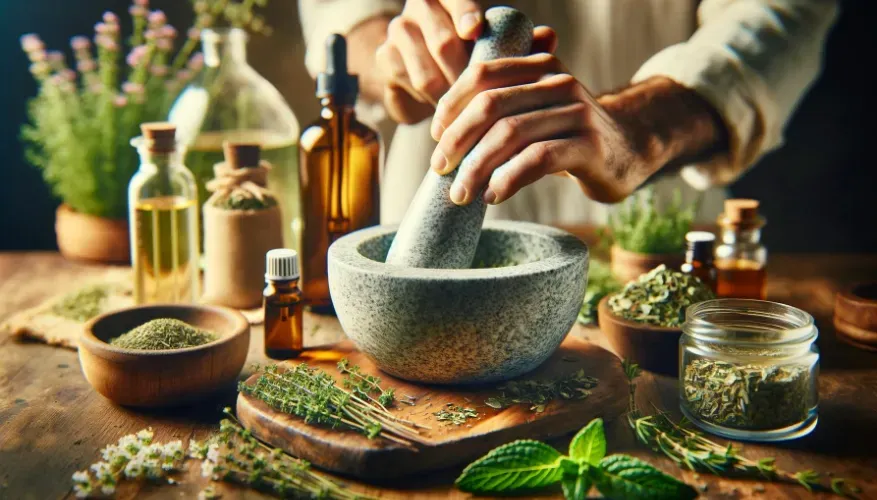How to Craft Your Own Herbal Mouthwash: Fresh Breath and Healthier Gums Naturally
Understanding the Benefits of Herbal Mouthwash
Natural Ingredients vs. Commercial Products
When considering oral health, the choice between natural ingredients and commercial products is crucial. Natural ingredients often provide a gentler approach. They tend to avoid harsh chemicals found in some commercial mouthwashes, which can sometimes irritate sensitive tissues in the mouth. By leveraging the inherent properties of herbs, users can enjoy a cleansing experience that harmonizes with the body's natural functions, leading to a healthier oral microbiome. This approach not only respects the body's natural state but also often results in fewer side effects and adverse reactions compared to synthetic alternatives.
Health Advantages of Herbal Mouthwash
Herbal mouthwashes not only freshen breath but also offer notable health advantages. For instance, many natural ingredients have antimicrobial and anti-inflammatory properties, which help in reducing gum inflammation, combating plaque, and preventing oral infections. These benefits make herbal mouthwashes an appealing option for those looking to enhance their dental health naturally, without exposing their bodies to synthetic compounds prevalent in many traditional oral care products.
- Antimicrobial Action: Natural ingredients like peppermint and tea tree oil can kill harmful bacteria that cause tooth decay and gum disease.
- Anti-inflammatory Benefits: Ingredients such as aloe vera and calendula help soothe inflamed gums and promote healing.
Key Herbal Ingredients and Their Properties
Peppermint: Cooling Freshness and Antibacterial Benefits
Peppermint is a powerhouse in the world of herbal oral care due to its strong antibacterial properties and refreshing flavor. The cooling sensation peppermint provides is an immediate perk, uplifting the oral hygiene experience. Moreover, it helps to eradicate harmful bacteria that can lead to dental decay and gum disease, making it an essential component of any homemade mouthwash.
Clove: Pain Relief and Antiseptic Properties
Clove oil is revered for its pain-relieving and antiseptic qualities. Historically, it has been used as a remedy for toothaches and other dental issues. Clove's eugenol content is particularly effective in numbing pain and reducing infections, making it a valuable ingredient for anyone looking to enhance their oral care routine with a comforting, therapeutic effect.
Aloe Vera: Anti-Inflammatory Agent
Aloe vera, commonly known for its skin-healing benefits, also plays a significant role in oral health. It's an effective anti-inflammatory agent that helps soothe irritated gums and promotes healing. Additionally, aloe vera can aid in reducing dental plaque and gingivitis symptoms, offering a multifaceted approach to oral care that goes beyond mere cosmetic freshening.
Cinnamon: Natural Antifungal and Antibacterial Agent
Cinnamon oil is a formidable foe against oral pathogens due to its potent antifungal and antibacterial capabilities. It targets the bacteria responsible for dental decay and gum disease, providing a double layer of protection. Moreover, its warm, spicy flavor can invigorate the senses, making every mouthwash session both therapeutic and enjoyable.
Tea Tree Oil: Versatile Germ Fighter
Tea tree oil is another versatile ingredient praised for its ability to fight germs—be they bacterial, fungal, or viral. Incorporating this oil into your herbal mouthwash can significantly enhance its effectiveness, particularly in soothing inflamed gums and preventing the onset of oral infections, thereby fortifying the overall health of your mouth.
Other Beneficial Herbs: Rosemary, Calendula, and Plantain
In addition to the mainstays, herbs like rosemary, calendula, and plantain make excellent additions to any herbal mouthwash. Rosemary offers antibacterial and cooling effects, while calendula is celebrated for its anti-inflammatory properties. Plantain, often overlooked, brings exceptional healing properties, especially beneficial for those with sore or damaged oral tissues.
- Rosemary: Known for its antibacterial properties that help reduce bacteria buildup.
- Calendula: A great anti-inflammatory that soothes gums.
- Plantain: Helps in healing wounds in the mouth.
How to Make Your Own Herbal Mouthwash
Recipe 1: Peppermint and Clove Mouthwash
For a simple yet effective herbal concoction, combine peppermint and clove oils. This blend not only freshens the breath but also offers antibacterial and pain-relieving benefits. Mix a few drops of each essential oil with distilled water, and you’ve got yourself a mouthwash that cools and soothes while maintaining impeccable oral hygiene.
Ingredients:
- 1 cup distilled water
- 10 drops peppermint essential oil
- 5 drops clove essential oil
- 1 tsp baking soda
Instructions:
- Mix all ingredients thoroughly in a glass container.
- Store in an airtight container and shake well before each use.
- Rinse for 30 seconds to 1 minute and spit out.
Recipe 2: Aloe Vera and Cinnamon Mouthwash
Aloe vera and cinnamon can create a mouthwash that targets inflammation and microbial infections. The soothing properties of aloe vera combined with the antimicrobial effects of cinnamon provide a potent remedy for those looking to maintain healthy gums and fresh breath. This mixture is particularly useful for those who experience frequent gum discomfort or swelling.
Ingredients:
- 1 cup aloe vera juice
- ½ cup distilled water
- 10 drops peppermint essential oil
- 5 drops cinnamon essential oil
- 2 tsp baking soda
Instructions:
- Combine all ingredients in a clean glass bottle and shake well.
- Use as needed, swishing around for 30 seconds and then spitting out.
Recipe 3: Tea Tree and Rosemary Essential Oil Rinse
Tea tree and rosemary oils are a dynamic duo for oral health. This mouthwash variant harnesses their germ-fighting and cooling properties, making it a superb choice for daily use. Blend these oils with a base like distilled water or aloe vera juice for an invigorative and therapeutic oral rinse that protects and refreshes.
Ingredients:
- 1 cup distilled water
- 5 drops tea tree essential oil
- 5 drops rosemary essential oil
- 1 tsp sea salt
Instructions:
- Mix all ingredients together in a sterilized container.
- Shake before use and rinse for 30 seconds.
Recipe 4: Baking Soda and Peppermint Oil Mix
Combining baking soda with peppermint oil yields a mouthwash that not only freshens the breath but also neutralizes oral acids, protecting the enamel from erosion. This recipe is particularly beneficial for those with acidic diets, as it helps maintain a balanced pH in the mouth, ensuring long-term dental health.
Ingredients:
- 1 cup distilled water
- ½ tsp baking soda
- 10 drops peppermint essential oil
Instructions:
- Stir all ingredients together in a clean bottle.
- Shake before each use and rinse for 1 minute.
Recipe 5: DIY Balanced pH Mouthwash for Acidic Diets
Creating a balanced pH mouthwash is crucial for individuals consuming acidic foods and beverages regularly. Incorporate ingredients like baking soda and peppermint oil to neutralize the oral environment, reducing the risk of enamel decay and promoting fresher breath. This recipe is an essential tool in the oral care arsenal for those looking to protect their teeth while enjoying their favorite foods.
Ingredients:
- 1 cup distilled water
- 1 tsp xylitol (optional)
- 5 drops peppermint essential oil
- 1 tsp baking soda
Instructions:
- Mix all ingredients thoroughly in a glass container.
- Shake before each use and rinse for up to 1 minute.
Step-by-Step Guide to Crafting Herbal Mouthwash
Preparation and Safety Tips
When preparing herbal mouthwashes, it’s important to prioritize safety and precision. Always use distilled or boiled water to ensure purity, and opt for high-quality, therapeutic-grade essential oils to avoid irritation. Additionally, ensure your containers and utensils are properly sanitized to prevent contamination, safeguarding the quality and effectiveness of your homemade mouthwash.
Selecting High-Quality Ingredients
The efficacy of a herbal mouthwash largely depends on the quality of its components. Invest in reputable brands for essential oils and other ingredients to ensure they contain the potent properties needed for effective oral care. Organic and sustainably sourced herbs are also preferable, as they're likely free from harmful pesticides and chemicals that could undermine your health goals.
Mixing Techniques and Storage Guidelines
Proper mixing techniques can maximize the benefits of your herbal mouthwash. Ensure thorough blending of oils and base liquids to create a homogeneous mixture. For storage, choose dark, glass containers to preserve the integrity of the essential oils. Store the mouthwash in a cool, dry place, and consider making small batches to maintain freshness and potency over time.
Integrating Herbal Mouthwash into Your Oral Care Routine
Frequency of Use and Complementary Practices
Integrating a herbal mouthwash into your daily routine can enhance oral hygiene significantly. For optimal results, use your mouthwash at least twice a day after brushing. Complement this practice with regular flossing and perhaps brushing with herbal toothpaste to maximize your oral health benefits and maintain a clean, fresh mouth throughout the day.
Monitoring Progress and Adjusting Formulas
As you continue using herbal mouthwashes, pay close attention to how your oral health evolves. If you notice improvements in gum health, less irritation, or fresher breath, you’re on the right track. However, if issues persist, don’t hesitate to adjust the ingredients or concentrations in your mouthwash. Personalization is key in achieving the best results for your unique oral health needs.
Enhancing Oral Health with a Holistic Approach
Adopting a holistic approach to oral care by incorporating herbal mouthwashes can significantly improve your overall health. Recognize that oral health is intricately linked to your body’s general well-being. By choosing natural, health-promoting practices, you ensure that your approach to oral hygiene contributes positively to your entire body's health, creating a harmonious health routine that benefits all aspects of your life.
Conclusion: Embrace the Natural Freshness of Herbal Mouthwash
Embracing herbal mouthwashes as part of your oral care routine not only enhances your dental health but also aligns with a lifestyle that prioritizes natural well-being. As you explore the various recipes and tailor them to your needs, you'll find that making your own mouthwash is not just economical and effective but also a gratifying way to take control of your health. Dive into the world of herbal remedies and experience a refreshing transformation in your oral care routine.





